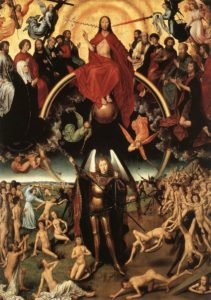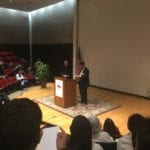UPDATED: Jesuit(s): If Georgetown Is Not Pruned, It Becomes an Obstacle
 This is a topic which has come up very much lately with the Pontifical Catholic University of Peru and Georgetown and will continue to come up. The Jesuit priest, Fr. Robert John Araujo, SJ, a graduate of Georgetown University and, the John Courtney Murray Professor at Loyola University Chicago School of Law. had the following to say on his blog:
This is a topic which has come up very much lately with the Pontifical Catholic University of Peru and Georgetown and will continue to come up. The Jesuit priest, Fr. Robert John Araujo, SJ, a graduate of Georgetown University and, the John Courtney Murray Professor at Loyola University Chicago School of Law. had the following to say on his blog:
….During Eastertide, we recall the teaching of Jesus Christ in his farewell discourse that he is the vine and we are the branches. Our Lord builds upon this theme by reminding his disciples that the branches which do not bear fruit but wither are collected and burned. John 15:1-11. But before the withered branches are removed for incineration, they are pruned in a good-faith effort to revive them. This is the imagery which I think Archbishop Michael Miller had in mind when he spoke at Notre Dame in 2005 (and then later, Boston College in 2006) and used the image of “evangelical pruning” that necessitate positive institutional changes by an educational institution if it is to remain faithful to the institution’s Catholic mission and identity [here]. However, if the pruning is unable to remedy the problems, it is reasonable to conclude that the institution is not an asset but an obstacle to the Church’s mission of education where the faith and reason are complementary and essential partners.Georgetown is my alma mater, and I have many fond memories of the college at which I matriculated almost fifty years ago. I had many fine Jesuit and lay teachers (amongst the latter, not all were Catholic but understood, respected, and celebrated the institution’s mission and identity as a Catholic and Jesuit center of learning) who helped me simultaneously cultivate my mind and soul. I don’t think I would have the same experience today if I were matriculating in the present day.Why? Was the decision to change the soul of the institution intentional? Probably not. But change has happened through decisions that persons responsible for the nature and soul of Georgetown have made freely over the years. The evidence of the withering of the Catholic soul has grown during the passage of time. I cannot say if there is still time for Georgetown, and other schools pursuing the same path, to self-prune, but I pray for this. Being an optimist, I want to say there may well be a final opportunity, but the time is growing short, very short, for this to happen.Almost twenty-two years have passed since Blessed John Paul II issued his apostolic constitution Ex Corde Ecclesiae addressing many important matters concerning
Catholic universities, their mission, and their identity. Some of the institutions which claim the modifier “Catholic” have taken the counsel of JPII to heart, but others have not. Georgetown is in the latter category, so it appears, judging from all the currently available evidence. Today I join the appeal of Professor Deneen and others acknowledging that much will be lost when this, the oldest Catholic university in the United States, takes that final step that severs itself from the Vine of Christ. As I said, there may still be time, and if there is, it is preciously little. The bonfire that may result is not one of vanity but of a soul. With the soul gone, the vanity will remain.RJA sj
Unfortunately the board of Georgetown is occupied by members who are generally opposed to the Church’s teachings. It used to be that the Jesuits would sit on the board of their own schools primarily…now it would be difficult to get it back even if they wanted to.
This is why Father Araujo says there is precious little time before he would suggest, it appears, that the Church abandon it (take its Catholic name away). Try pruning first, if that doesn’t work…what do you do with obstacles to your (the Church’s) mission? Well you surely don’t leave them sitting in your camp.
Show your support for the upcoming canon lawsuit to be filed by Georgetown grad and author of “The Exorcist” Peter Blatty. A trial can’t hurt, it could only help. Sign the petition and like the group on Facebook.
UPDATE 9:08AM CST 23/05/2012: Fr. James Schall SJ, professor of Political Philosophy at Georgetown has also written a piece here on the same problem. Excerpt below:
Catholics, ironically, are seeing their freedoms restricted and ended by the aid of other Catholics, political and academic, who have denied, in practice, any real connection between reason and revelation.




